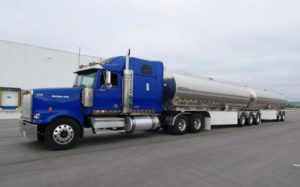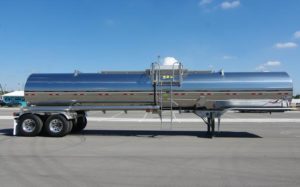Most people have considered leasing versus purchasing a personal vehicle; however, when it comes to industrial equipment and in our industry, highway tankers, the rationale is quite a bit different and does not necessarily apply to all industrial and transportation equipment. It must make good business sense.
Let’s consider some factors which justify operating leases for Highway Tankers:
- The high capital cost of the highway tanker
- The length of the contract for the transportation work
- The risk of idle equipment once the contract ends
- The specialty requirements of the commodity to be transported
- The high amount of working capital which can be “freed-up”
- The opportunities which may be compromised because capital is tied up in specialized equipment
If any of these factors are considered threats to the corporate objectives, then an operating lease can eliminate all of them.
1) The high capital cost of the highway tanker:
Even a relatively low-cost tanker is still in the range of $80,000 to $100,000. High-pressure B-Trains run closer to $500,000 and the majority are in the range of $250,000 to $400,000. Regardless of the size of your company this will be a capital expenditure which will divert capital from other opportunities for more profitable return on equity invested. Operating leases solve the problem. For growing companies access to capital simply to fund accounts receivable, employ needed personnel etc., may be limited because so much money is tied up in high cost tankers. Another compelling reasoning for leasing may not be so obvious. Leasing companies tend to depreciate the asset over a longer term. This is reflected in the rate and often it can’t be achieved otherwise. Higher depreciation of owned equipment will affect the operating profit of the company.
2) The length of the contract:
Most contracts will have a length of two or three-year term and then they have to be re-bid. Often those contracts can be renewed, but there is no guarantee and there is always the thought. What do I do with this equipment if they do not renew? Operating leases completely illuminate this risk as the equipment can simply be returned. Even a delay or idle time between putting that equipment back to work can affect profit. The question needs to be asked “is the risk and the idle time in between contracts worth it?”
3) The risk of utilizing a tanker, once the contract ends:
This is closely related to the previous paragraphs. If the tanker is owned, there is always the pressure to rebid the contract at a lower rate simply because of the amount of capital tied up in that piece of equipment. It is probably better to go after another more profitable contract; return the tanker and lease whatever is ideal for the new contract and commodity. Quite possibly a different configuration of tanker.
4) The specialty requirements of the commodity to be transported:
Every customer has specific variations which make their operation unique. It may be the commodity itself. It’s not just simply whether you run it in an aluminum or stainless-steel tank. It may require multiple compartments in order to deliver smaller quantities of different materials originating at the same source. It almost always must be specific configurations or unloading positions. Often there is a change in their customer delivery locations requiring different axle spreads to run various jurisdictions. (This is a very common reason for changing out equipment with many of our customers). It is common for contracts to start out being hauled in tandem trailers and then as the volume increases it requires more and more axles. The commodity could be carried in a tandem, but the profitability is greatly increased as you can go to more axles. We often will change equipment within the lease contract. We offer flexibility regardless of the length of the initial contract. We can always find a home for the equipment that is coming off lease.
5) The amount of working capital which will be impaired:
As already mentioned operating leases free up capital which could be used more profitably. Transcourt Tank Leasing can take the risk as we provide equipment to a wide range of industries, and geographically we are supplying tankers throughout North America. Often, we can move equipment between provinces and states in order to service customers. What is a risk for most tanker transport companies is not a high risk for Transcourt. We can readily place equipment elsewhere. Leasing lets you keep that capital, so it can be employed elsewhere in one’s company.
6) The opportunities which may be compromised because capital is tied up:
Every company likes to have reserve capital in order to move on opportunities which appear, sometimes with no warning. It is nice to be in a position when something opportunistic comes along; to be able to move on it. Because tankers are one of the higher capital items in the transportation industry, very high capital costs can be completely eliminated with operating leases.
To summarize it all; leasing tankers is really all about employing capital efficiently and having capital available for more profitable opportunities.
John Campbell.



Recent Comments